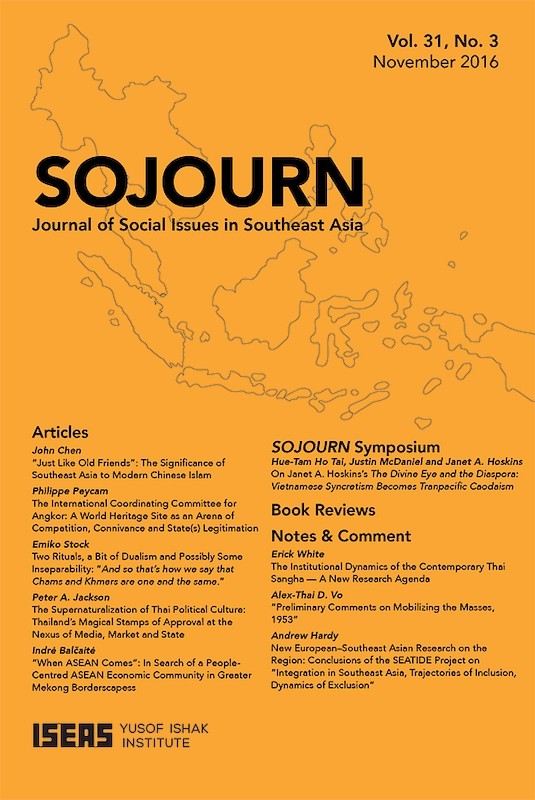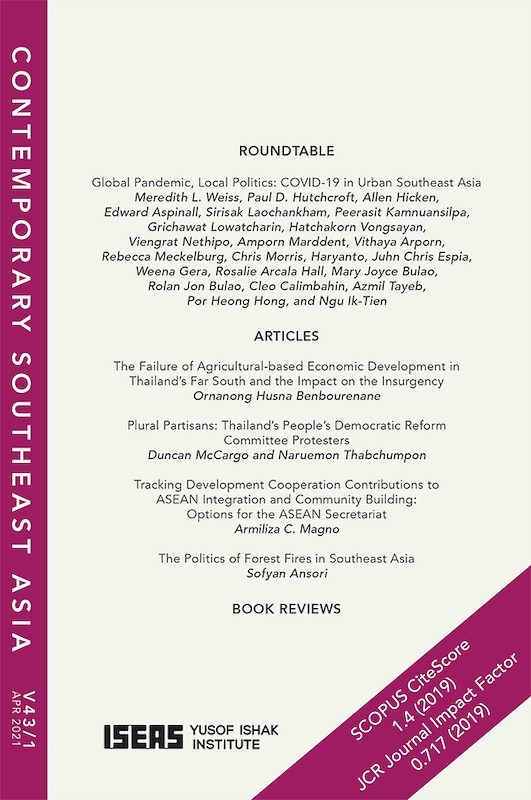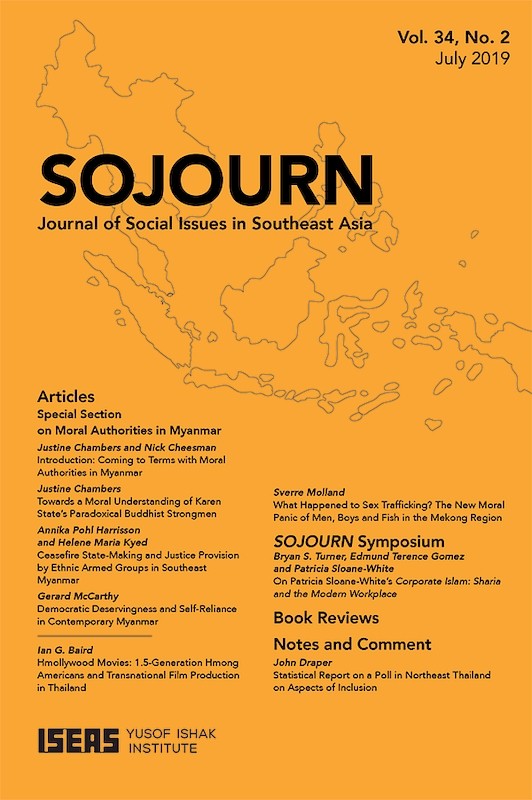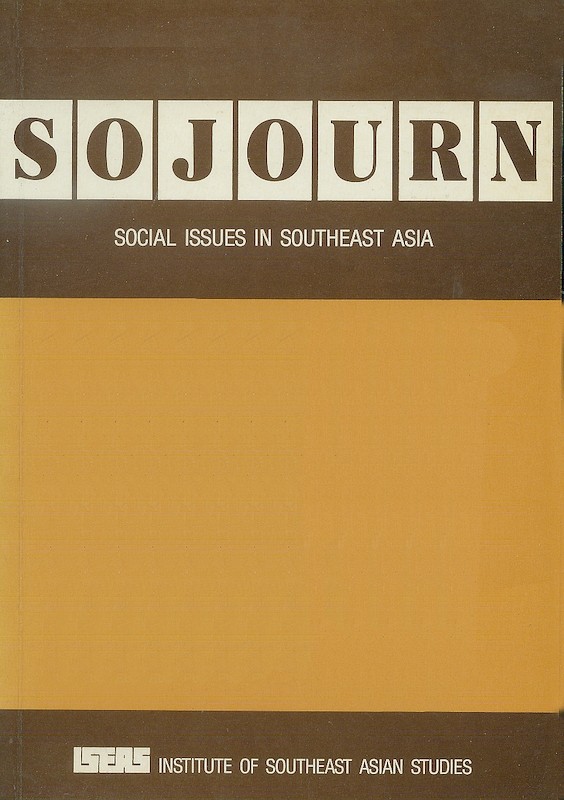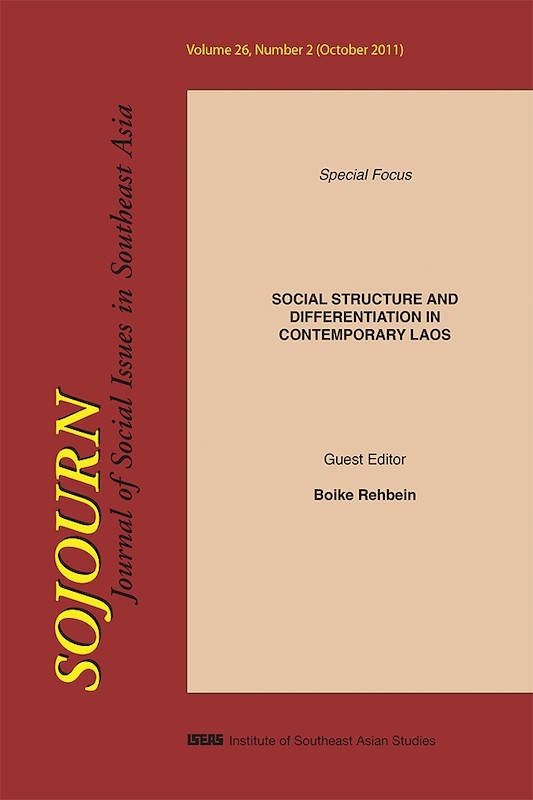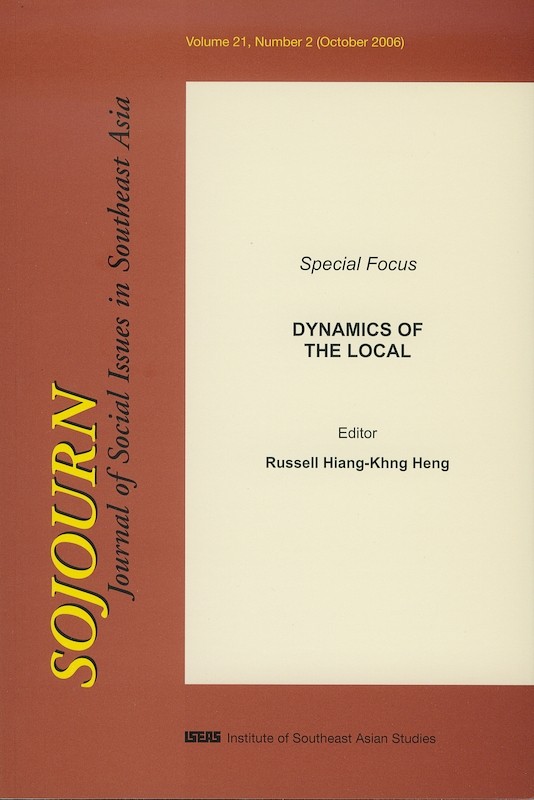SOJOURN: Journal of Social Issues in Southeast Asia Vol. 10/2 (Oct 1995)
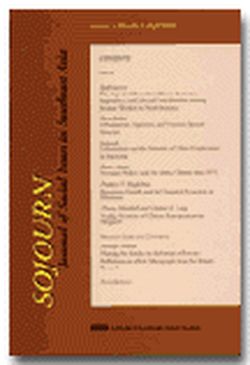
Date of publication:
October 1995
Publisher:
Institute of Southeast Asian Studies
Number of pages:
209
Code:
SJ10/2
Contents
-
Preliminary pages, with Editor's Note
-
In Search of the Post-colonial in Indonesian Literature, by Keith Foulcher, author see abstractConceived in historical terms, the post-colonial paradigm identifies three distinct types of historical space, moving from the initial awareness of non-authenticity to a final repudiation of nationalism's Self-Other binary in a fully politicized recognition of unstable cultural location. The absence of recognizably post-colonial characteristics in Indonesian literature is related to the unbroken nexus between literature and nationalism in independent Indonesia itself produced in a new "colonizing" language with submerged connections to the former colonial language, Indonesian literature has specific characteristics that set it apart from the post-colonial paradigm. In this respect, the work of Pramoedya Ananta Toer is problematic, however.
-
A State of Uncertainty: Political Economy of Community Resource Management at Tab Salao, Thailand, by Philip Hirsch, author see abstractCommunity resource management has attracted increasing interest as a direction for more equitable, effective, and sustainable use of the environment Development programmes and academic studies have investigated institutional and organizational potentials and obstacles Relatively little attention has been given to the local and wider political-economic contexts in which local initiatives are expected to operate. A case-study of resource management at Tab Salao in western Thailand exemplifies the constraints experienced by communities in the face of ambiguity and uncertainty created by hegemony over resources by the state, and its alliance with local economic interests.
-
Hmong Demographic Changes in Laos: Causes and Ecological Consequences, by Randall Ireson, author see abstractThis paper seeks to compare migration and residence patterns of Hmong villages in eastern Xieng Khouang, Laos, with traditional patterns recorded elsewhere. The villages studied are stable, primarily populated by nuclear family households, and have rapid population growth. The long history of Hmong residence in the district, lack of significant competition from other ethnic groups, local ecology, effects of the Indochina wars, and recent government policy are proposed to explain these patterns. Continued population growth of Hmong and neighbouring groups, coupled with government restrictions on forest access will necessitate significant demographic and economic changes in the future.
-
Inter-Ethnic Relations and Tourism in Bima, Sumbawa, by Michael Hitchcock, author see abstractIslam is a universalistic creed that transcends ethnic and national boundaries Muslims share a broadly based common heritage and identify with the wider Islamic community. The accession of Sultan Abdul Kahir in the seventeenth century marks the beginning of the Islamization of Bima, and Makasar and Malay influences are readily detectable. The court facilitated the entry of this world religion, though it was never cut off from its less Islamic hinterland. Court ceremonials stressed the harmony of Islamic and customary law, and the contribution made by the different ethnic groups. The signifiers changed over time in response to changing socio-political realities. The courts identity, dormant since the early post-colonial era, re-emerged in the 1980s, partly in response to tourism and the drive for national integration.
-
The Relevance of Ethnicity in the Depletion and Management of Forest Resources in Northeast Luzon, Philippines, by A Doedens, C Wedda, Gerard A Persoon, authors see abstractThis article deals with the importance of ethnicity in the depletion of the forest resources in the Sierra Madre (northeast Luzon, Philippines). It argues that the ethnically highly diverse population living on the forest edge shows little variation in the exploitation of available resources. All ethnic groups seem to be engaged in the same kind of activities irrespective of their cultural background. However, once resources become more scarce and the population is offered opportunities for community forestry, ethnicity becomes a highly relevant factor for the future management of diminishing resources.
-
Some Characteristics of the Changing Social Structure in Rural Vietnam under ITDoi Moi., by To Duy Hop, author see abstractReform policies in Vietnam have caused a change in occupational structure in the whole of rural Vietnam. This article focuses on changes at the level of households and village/commune Generally, the trend is to move towards de-agriculturization where farmers or entire farming communities diversify their sources of income by engaging in many other non-agricultural activities. Generally, this has enriched the rural population, but the connection between de-agriculturization and wealth generation is not a straightforward one. The pace has also been slow, but where it has taken place, it has had a social impact by causing disparity in incomes and standards of living and also revolutionizing peoples attitudes towards farming for a living.
-
Historical, Ethnographic, and Contemporary Political Analyses of the Muslims of Kampuchea and Vietnam, by Raymond Scupin, author see abstractThis paper surveys the historical, early ethnographic, and contemporary political analyses of the Cham Muslims of Kampuchea and Vietnam. The historical overview describes the Indic and Islamic influence on the traditional kingdom of Champa, the consequences of French colonialism, and the results of the Vietnam war. The ethnographic description of the Cham is based on early French scholarly depictions that were influenced by Orientalist modes of representation. The contemporary political analysis is derived from scholarly attempts at assessing the recent situation of Cham Muslims as they faced genocide in Cambodia and experienced ethnic repression in Vietnam.
- BOOK REVIEWS
-
BOOK REVIEW: Dissociated Identities: Ethnicity, Religion and Class in an Indonesian Society. Edited by Rita Smith Kipp., by Heddy Shri Ahimsa-Putra, author
-
BOOK REVIEW: The Heritage of Traditional Agriculture among the Western Austronesians. Edited by James J Fox., by Mohamed Yusoff Ismail, author
-
BOOK REVIEW: Shari'a Law and the Modern Nation-State. A Malaysian Symposium. Edited by Norani Othman., by Mona Abaza, author
-
BOOK REVIEW: Forging New Paths: Feminist Social Methodology and Rural Women in Java. Edited by Jutta Berninghausen and Brigit Kerstan., by Fatimah bte Abdullah, author
-
BOOK REVIEW: L'image de la femme dans les litteratures modernes indonesienne et malaise. Edited by Monique Zaini-Lajoubert., by Laurent Metzger, author
-
Index to SOJOURN: Journal of Social Issues in Southeast Asia, vol. 10 (1995)

